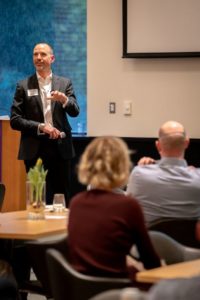Climate pledges take center stage at Idea Lab event

Over 150 business leaders, scientists, government officials and UW Foster School of Business faculty and students gathered in PACCAR Hall on Thursday night to discuss the role of corporations in combating climate change in an event hosted by the Foster MBA Association’s (MBAA) Net Impact organization.
Wendy Guild, the assistant dean of MBA Programs, set the tone in her opening remarks. “The Foster School of Business is situated at an advantageous nexus of tremendous thought leadership and energy dedicated to business solutions to the social consequences of climate change,” Guild said. “Join us in being part of a solution for a better, healthier planet for the benefit of all.”
The Idea Lab conference keynote was a discussion with Sally Fouts, director of the climate pledge at Amazon, and Mark Kroese, GM of sustainability solutions at Microsoft, moderated by Sally Jewell, former Secretary of the Interior and current Edward V. Fritzky Chair in Leadership at the Foster School.
The senior sustainability leaders at the two global technology behemoths spoke of the progress and realities of the climate pledges both companies have made. Amazon has committed to achieving net-zero carbon by 2040, while Microsoft is striving to be carbon negative by 2030.
For Amazon, which fulfills an estimated 1.6 million orders per day and operates one of the world’s largest data centers, achieving carbon neutrality will involve every aspect of operations. From writers at shows at Amazon Studios to cashiers at Whole Foods, “when the pledge was announced, it became our North Star,” Fouts said. “It gave us the thing to work toward and rally around.”
But with so many business units spanning multiple industries, Amazon’s team realized they would not be able to achieve this goal without its partners also reducing emissions. So Amazon has been championing a climate pledge to business of all sizes across the globe.
Amazon and Microsoft are joined by over 300 companies across 50 industries in signing the pledge, which has three components. The first is to measure and report on a company’s own carbon emissions. The second is for companies to reduce their emissions as much as reasonably possible. The third is to commit to the purchase of credible carbon offsets to achieve carbon neutrality.
As part of raising awareness of the effort, Amazon purchased the naming rights to the former Key Arena, now known as Climate Pledge Arena, and transformed the space into the first net zero certified arena in the world. In addition to the publicity value that generated, Fouts explained that while not immediately obvious, the project also was a contextual fit.
“It demonstrates that you can have the things that people still love to do, like going to sporting events and live music, but we can do it in a greener way,” she said.
Kroese outlined a similar company-wide approach at Microsoft. He presented the decision to focus on emissions as both a moral imperative and business necessity.
If you are embedded in most major economies in the world and the world around you is crumbling, you don’t have a business.” – Mark Kroese, GM of sustainability solutions at Microsoft
“One (motivation) is idealistic. Wealthy companies should do their part and then do more,” Kroese said. “The most vulnerable in the world are clearly the most effected and contribute the least to causing climate change. If you are embedded in most major economies in the world and the world around you is crumbling, you don’t have a business.”
Kroese also sees tremendous business opportunities in addressing the world’s climate crisis. He predicts that “there will be Microsoft and Amazon-sized companies that emerge from climate tech.”
Jewell posed questions to Fouts and Kroese that had been submitted by Foster MBA students. She added insights from her roles as CEO of REI and Secretary of Interior, during which time she attended the signing of the Paris Climate Accord with President Obama.
“Sustainability is a team sport,” Jewell said. “It not something where anybody has a competitive advantage. We all have to work together.”
Following the keynote were four breakout sessions: evolving the energy grid, environmental investment and financial instruments, the future of food, and climate-friendly building and construction practices.

Charlie Donovan
The Green Finance breakout was moderated by Charlie Donovan, a visiting professor of sustainable finance at Foster. Panelists included Jo Brickman, director of impact strategy at VertureLab, who explained her firm’s use of catalytic capital to provide funding and support to climate tech startups.
Foster graduate Charlie Daitch, now a director of energy and water at Amazon Web Services, said that for his clients, which include some of nation’s largest data companies, sustainability is a core requirement. “We don’t have to explain to our customers why this is so important,” Daitch said.
The discussion around modernizing the power grids locally and nationwide was led by Sarah Vorpahl, a fellow Foster graduate and senior energy policy specialist for the Washington State Department of Commerce.
In between presentations, audience members including investment bankers, climate startup consultants and current MBA students mingled and networked with one another.
“This is the group of people that is going to lead us in to the future,” Kroese said.
